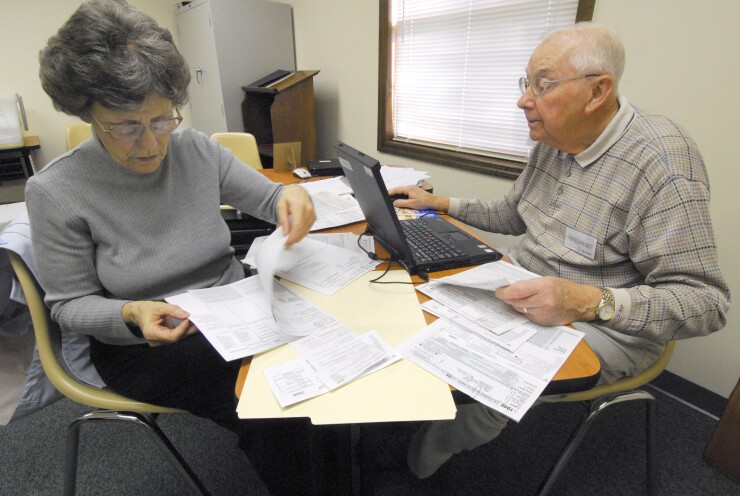
“Would you like to help put more money in the hands of working people?” reads one call for volunteer preparers. “Just think - an hour of your time can mean $5,000 in additional income for a working family!”
It’d be nice to give something back and to not have the gesture take too much time away from your paying work. Appreciation for your volunteer prep work would be good, too.
Can you get all three? Some preparers rave about donating professional time. Others, not so much.
“I believe in giving back to your local nonprofit organizations and communities,” said Enrolled Agent Paul Thompson of Premier Accounting & Tax Inc. in Virginia. “Most organizations will also list your firm as a supporter of their cause or event, which translates to new clients. I’ve not experienced any drawbacks.”
“They give no respect for your license or degrees,” said EA James Berardi in San Antonio.
“The benefits are personal satisfaction, using your skills to help those who aren’t as fortunate as you; you could also get referrals from this service,” said James Perkins, a CPA in Arlington Heights, Ill. “The drawbacks are taking valuable time away from your daily duties.”
“The opportunity to associate with people in your community, and possibly acquiring new clients through these associations,” said William Keats, an EA at Keats Tax & Financial Service, in North Merrick, N.Y. “The biggest drawback is loss of income due to the time commitments associated with the organizations.”
“The feeling of giving back, offering my expertise to those who can’t afford it, and going to sleep with a smile on my face,” said preparer Eric Hansen of Hansen Accounting, in Omaha, Neb. The downside? “A few recipients make me feel like they deserve it, rather than thanking me,” he said.
Enjoying the work
Time in the profession can also temper the benefits. “I’m sure there could be benefits – more to someone starting out – but with over 35 tax seasons, a growing clientele and firm, and logging 100 hours per week from mid-January to April 15, the drawbacks are great [for me],” said Charles Grass of Grass CPA & Associates and Grass Wealth Management, in Renton, Wash.
Grass cited the risks of distraction of splitting time between locations and product/service types and exposure, “as all that we do is seen to attach to our credentials, licensing and business.”
An
“I love volunteering at the local
“One side benefit was that it made it easier for me to charge full price at the office: Anyone who was overly price-sensitive could either pay full price in my office or go stand in line at the free clinic. It made those conversations both easier and shorter.”
Gaddis added that he did stop volunteering because the clinic’s hours now conflict with most of his regular workday. “I don’t mind giving four or five hours a week, but I can’t give up an entire day during tax season,” he said. “It’s also a challenge to stay up to date in two different software packages and I occasionally got in ‘trouble’ for doing too much (going out of scope).”
Volunteering can take different forms. “I don’t do volunteer preparation with any local organizations [but] I do some pro bono work for clients that can’t afford to have their taxes prepared,” said Laurie Ziegler, an EA at Sass Accounting in Saukville, Wis. “Also, I offer large discounts for completing the tax returns for nonprofit organizations.”
“The primary benefit is keeping our name out there in front of likely clients and reinforcing existing clients that we are still important for them,” said Daniel Setters, an EA at Accounting plus Tax Solutions Inc. in Champaign, Ill. “The drawback is that we open the phone lines for those that want ‘free advice’ or ‘Can you help me with this form?’ We always invite them to our office to discuss their situation, and they more often than not are a no-show.”
Phoenix CPA Joanne Elsen agrees that giving back brings exposure, but it’s a “secondary” benefit. “I don’t volunteer because of what I consider the drawbacks,” Elsen added. “As a sole practitioner with no administrative help, the loss of time in my own office can be a major drawback. I also am concerned about liability.”
‘Even if I could bill them’
EA Kerry Freeman at Freeman Income Tax Service in Anthem, Ariz., sees “nothing but drawbacks” to volunteering even before the first client walks in and approaches the table.
“Often when a group that I volunteer for finds out that I do taxes, they hand me half-dozen IRS notices for back filings and noncompliance,” she said. “These are very small clubs that have lots of changeover in the secretary or treasurer position, and it takes lots of what could be billable hours to go through and resolve their issue. Even if I could bill them,” Freeman added, “they often don’t have any money to pay.”
Burnout can be another danger. The AICPA offers these questions to stay fresh on an unpaid job that can nonetheless stress you:
- What is your goal for being involved? Besides helping to further the cause, you may want to gain leadership skills, meet more people or work directly with individuals to make a difference. Identify the skills you want to attain through your volunteer service.
- How much time can you give? With busy careers and family, volunteering may take a back seat to other priorities. Determine how much time you have to give, then set your schedule. Organizations are usually very good about working around your time.
- What impact do you want to have? Decide beforehand where you’ll get the most enjoyment and sense of accomplishment.




